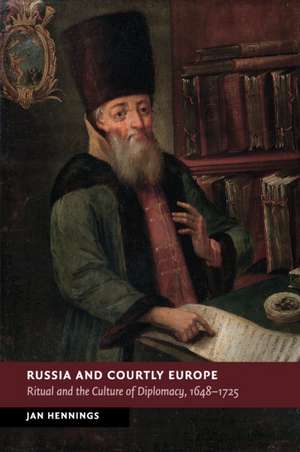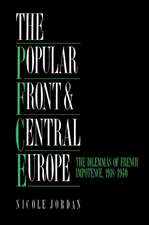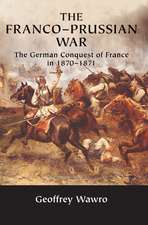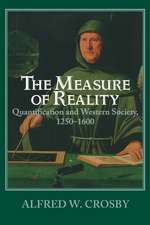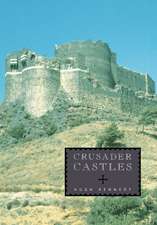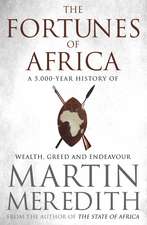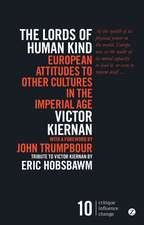Russia and Courtly Europe: Ritual and the Culture of Diplomacy, 1648–1725: New Studies in European History
Autor Jan Henningsen Limba Engleză Paperback – 28 noi 2018
| Toate formatele și edițiile | Preț | Express |
|---|---|---|
| Paperback (1) | 286.30 lei 6-8 săpt. | |
| Cambridge University Press – 28 noi 2018 | 286.30 lei 6-8 săpt. | |
| Hardback (1) | 695.74 lei 6-8 săpt. | |
| Cambridge University Press – 26 oct 2016 | 695.74 lei 6-8 săpt. |
Din seria New Studies in European History
-
 Preț: 238.02 lei
Preț: 238.02 lei -
 Preț: 237.92 lei
Preț: 237.92 lei -
 Preț: 208.49 lei
Preț: 208.49 lei - 9%
 Preț: 593.70 lei
Preț: 593.70 lei -
 Preț: 398.41 lei
Preț: 398.41 lei -
 Preț: 177.91 lei
Preț: 177.91 lei -
 Preț: 211.13 lei
Preț: 211.13 lei - 9%
 Preț: 592.60 lei
Preț: 592.60 lei -
 Preț: 169.70 lei
Preț: 169.70 lei -
 Preț: 166.99 lei
Preț: 166.99 lei -
 Preț: 266.53 lei
Preț: 266.53 lei -
 Preț: 241.90 lei
Preț: 241.90 lei -
 Preț: 429.99 lei
Preț: 429.99 lei -
 Preț: 400.05 lei
Preț: 400.05 lei - 11%
 Preț: 698.50 lei
Preț: 698.50 lei -
 Preț: 275.85 lei
Preț: 275.85 lei -
 Preț: 330.09 lei
Preț: 330.09 lei - 11%
 Preț: 695.93 lei
Preț: 695.93 lei -
 Preț: 423.10 lei
Preț: 423.10 lei -
 Preț: 340.13 lei
Preț: 340.13 lei - 11%
 Preț: 698.30 lei
Preț: 698.30 lei -
 Preț: 326.82 lei
Preț: 326.82 lei -
 Preț: 339.37 lei
Preț: 339.37 lei -
 Preț: 396.59 lei
Preț: 396.59 lei -
 Preț: 383.48 lei
Preț: 383.48 lei -
 Preț: 292.40 lei
Preț: 292.40 lei - 14%
 Preț: 682.94 lei
Preț: 682.94 lei -
 Preț: 282.75 lei
Preț: 282.75 lei -
 Preț: 417.07 lei
Preț: 417.07 lei -
 Preț: 437.18 lei
Preț: 437.18 lei - 14%
 Preț: 873.67 lei
Preț: 873.67 lei -
 Preț: 420.40 lei
Preț: 420.40 lei -
 Preț: 319.99 lei
Preț: 319.99 lei - 14%
 Preț: 687.39 lei
Preț: 687.39 lei -
 Preț: 397.01 lei
Preț: 397.01 lei - 11%
 Preț: 695.93 lei
Preț: 695.93 lei - 11%
 Preț: 543.84 lei
Preț: 543.84 lei
Preț: 286.30 lei
Nou
Puncte Express: 429
Preț estimativ în valută:
54.79€ • 56.88$ • 45.69£
54.79€ • 56.88$ • 45.69£
Carte tipărită la comandă
Livrare economică 22 martie-05 aprilie
Preluare comenzi: 021 569.72.76
Specificații
ISBN-13: 9781107646131
ISBN-10: 1107646138
Pagini: 309
Ilustrații: 17 b/w illus.
Dimensiuni: 151 x 227 x 15 mm
Greutate: 0.42 kg
Editura: Cambridge University Press
Colecția Cambridge University Press
Seria New Studies in European History
Locul publicării:New York, United States
ISBN-10: 1107646138
Pagini: 309
Ilustrații: 17 b/w illus.
Dimensiuni: 151 x 227 x 15 mm
Greutate: 0.42 kg
Editura: Cambridge University Press
Colecția Cambridge University Press
Seria New Studies in European History
Locul publicării:New York, United States
Cuprins
Notes on transliteration, spelling, and dates; List of illustrations; Acknowledgements; Abbreviations; Introduction; 1. Barbarous ceremonies? Russia's places in early modern diplomacy; 2. Facts and fictions: the organisation of diplomatic practice; 3. Through the prism of ritual: Anglo-Russian encounters in the seventeenth century; 4. Stage and audience: the Grand Embassy to Vienna (1698) and Peter I's visit to Paris (1717); 5. From insult to imperator: changes and continuities in the reign of Peter I; Conclusion; Bibliography.
Recenzii
'Forces a reconsideration of long-established assumptions. There have been few more impressive scholarly débuts than this dazzling study.' Hamish Scott, Slavonic and East European Review
'This impressive debut monograph by Jan Hennings examines Russia's position and activity in the European diplomatic sphere between the Peace of Westphalia and the death of Peter I. … It will be a stimulating and informative work for any scholar who has an interest in early modern history, whether of Europe or Russia, or in diplomacy more generally. On a technical level, the publisher is to be commended for providing high-quality reproductions of images and archival texts, which provide useful illustrations to support the argument.' Paul Keenan, European History Quarterly
'This cogent book is about more than diplomacy; it gets to the heart of debates about Russia's image and place in Europe.' Nancy Shields Kollmann, Slavic Review
'Jan Hennings has produced a fascinating and well-researched study of Muscovite and Petrine diplomacy that places Russian foreign policy in the context of European baroque culture. … Russia and Courtly Europe is a superb study that every historian of Muscovite and Imperial Russian history will want to read.' Elise Kimerling Wirtschafter, Canadian-American Slavic Studies
'Hennings's Russia and Courtly Europe makes a fundamental contribution to the history of diplomacy … Hennings has written a monograph rich in new insights. It is a great example of how the study of symbolic communication can renew diplomatic history.' Damien Tricoire, Kritika
'Narrow channels of communication, sharply prescribed forms and genres of reporting, and restrictive rules about what diplomats could and could not do in particular situations all lent Muscovite interactions a distinctive flavor, but did not set it far apart from its contemporaries. Hennings manages not only to present this information with verve and clarity, but also to inflect it consistently with his important argument about Russia's participation in a shared field of court ceremony and the high stakes involved in succeeding in that arena … Based on research in archives in Russia, Austria, France, and Britain, using both visual and textual sources, and built on wide-ranging erudition, Russia and Courtly Europe sheds truly new light on a much-studied era.' Valerie Kivelson, Hungarian Historical Review
'Hennings's vision of Russia as part of a larger continuum of diplomatic practice, rather than as an unusual, curious, peculiar, barbaric outlier, and of the reign of Peter the Great as one of part of an ongoing process of adaptation, is largely convincing.' Alison K. Smith, The Journal of Modern History
'Apart from Russianists, this book would also prove highly relevant to Ottomanists and scholars of other polities sharing diplomatic relations with European powers.' Darren M. Smith, Diplomatica 2
'This impressive debut monograph by Jan Hennings examines Russia's position and activity in the European diplomatic sphere between the Peace of Westphalia and the death of Peter I. … It will be a stimulating and informative work for any scholar who has an interest in early modern history, whether of Europe or Russia, or in diplomacy more generally. On a technical level, the publisher is to be commended for providing high-quality reproductions of images and archival texts, which provide useful illustrations to support the argument.' Paul Keenan, European History Quarterly
'This cogent book is about more than diplomacy; it gets to the heart of debates about Russia's image and place in Europe.' Nancy Shields Kollmann, Slavic Review
'Jan Hennings has produced a fascinating and well-researched study of Muscovite and Petrine diplomacy that places Russian foreign policy in the context of European baroque culture. … Russia and Courtly Europe is a superb study that every historian of Muscovite and Imperial Russian history will want to read.' Elise Kimerling Wirtschafter, Canadian-American Slavic Studies
'Hennings's Russia and Courtly Europe makes a fundamental contribution to the history of diplomacy … Hennings has written a monograph rich in new insights. It is a great example of how the study of symbolic communication can renew diplomatic history.' Damien Tricoire, Kritika
'Narrow channels of communication, sharply prescribed forms and genres of reporting, and restrictive rules about what diplomats could and could not do in particular situations all lent Muscovite interactions a distinctive flavor, but did not set it far apart from its contemporaries. Hennings manages not only to present this information with verve and clarity, but also to inflect it consistently with his important argument about Russia's participation in a shared field of court ceremony and the high stakes involved in succeeding in that arena … Based on research in archives in Russia, Austria, France, and Britain, using both visual and textual sources, and built on wide-ranging erudition, Russia and Courtly Europe sheds truly new light on a much-studied era.' Valerie Kivelson, Hungarian Historical Review
'Hennings's vision of Russia as part of a larger continuum of diplomatic practice, rather than as an unusual, curious, peculiar, barbaric outlier, and of the reign of Peter the Great as one of part of an ongoing process of adaptation, is largely convincing.' Alison K. Smith, The Journal of Modern History
'Apart from Russianists, this book would also prove highly relevant to Ottomanists and scholars of other polities sharing diplomatic relations with European powers.' Darren M. Smith, Diplomatica 2
Notă biografică
Descriere
This book explores diplomacy and ritual practice at a moment of new departures and change in both early modern Europe and Russia.
